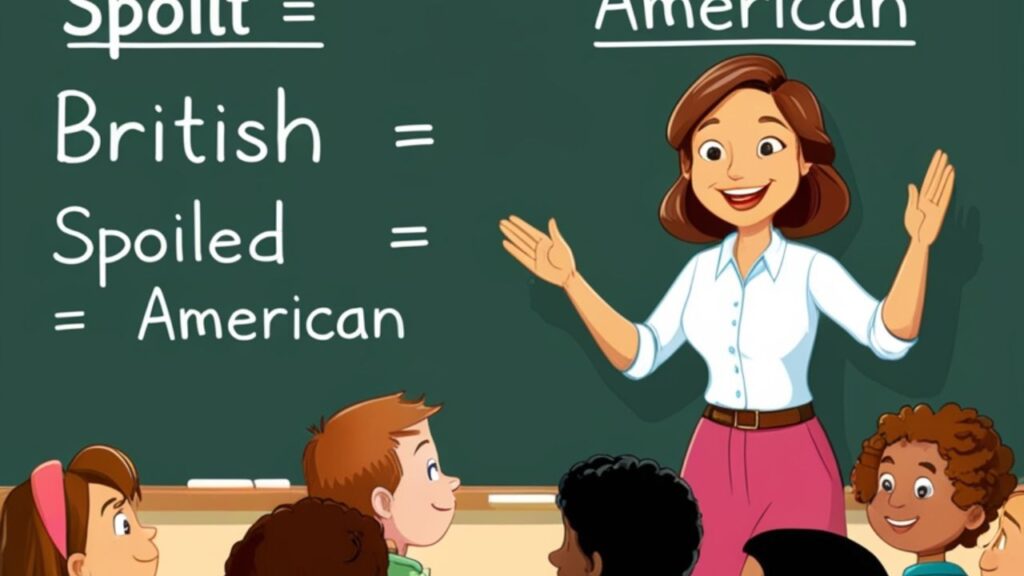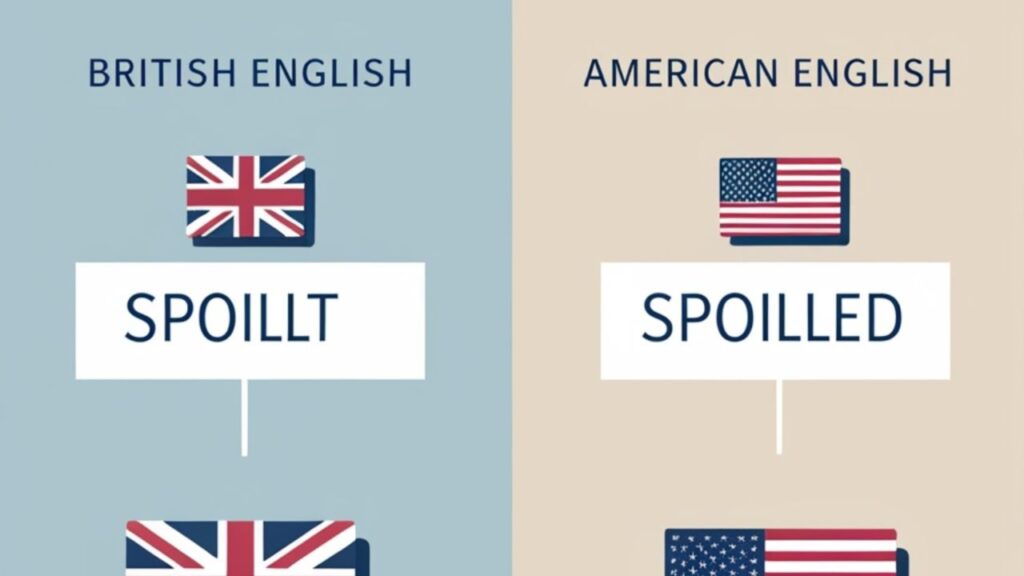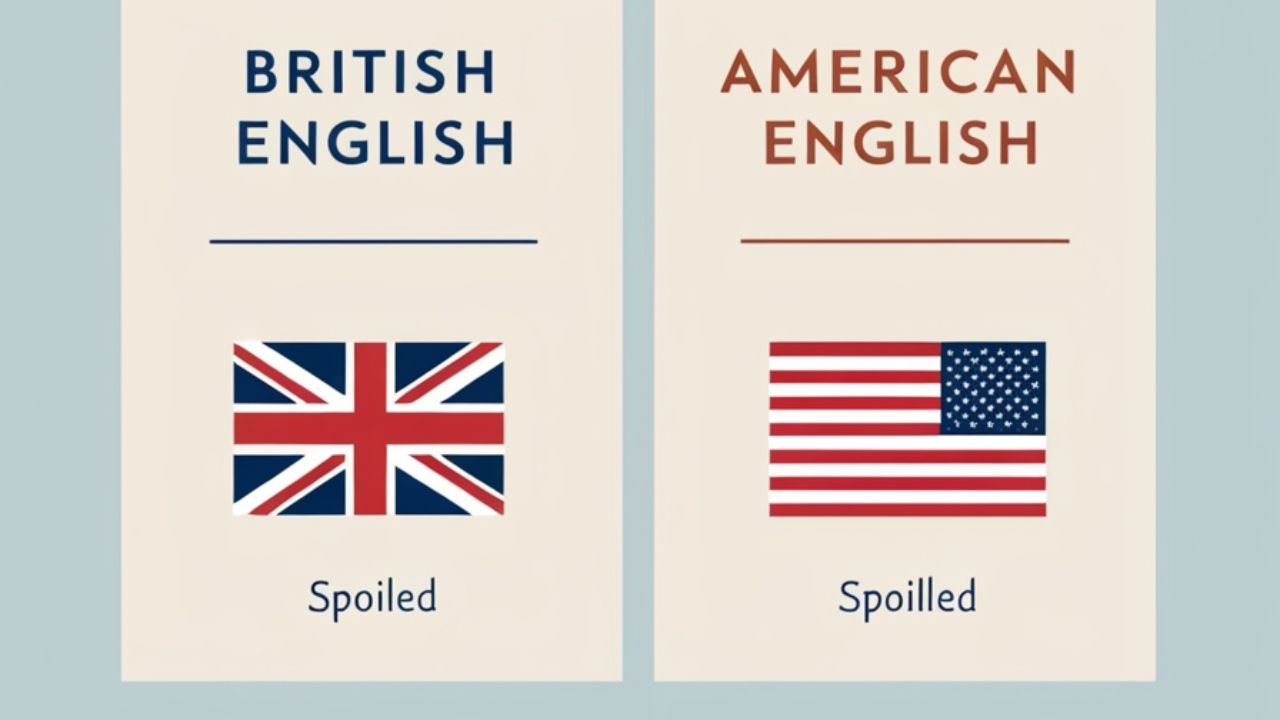The word spoiled means something that has gone bad or been treated too gently. People use it in many ways, like when food goes bad or when a child gets too much attention. It’s a word you often hear in American English.
In British English, people sometimes use spoilt instead of spoiled. Both mean the same thing. Writers in the UK like using spoilt because it sounds older and more classic. It still fits nicely in stories and formal writing.
Language changes as people speak and write in different ways. Over time, both spoiled and spoilt stayed correct. The choice depends on where you live or what sounds better in your sentence. Both words show how flexible English can be.
Tracing the Origins: Spoiled or Spoilt?
The word spoiled came from old Latin and French words that meant to take away or ruin something. Over time, English speakers started using it when food went bad or when someone was treated too nicely. It became a common everyday word.
In the UK, people also began saying spoilt with the same meaning. Both forms grew together as English changed through history. Writers liked using spoilt because it felt older and more traditional. Today, both words remind us how language keeps growing and changing.
Historical Evolution
- Old Roots: The word came from Latin spoliare, which meant to take away or strip something of value.
- French Influence: Later, Old French added the word espoillier, which shaped the English form “spoil.”
- Early English Usage: Both spoilt and spoiled appeared in old English writings and shared the same meaning.
- Regional Split: As English spread, the UK kept spoilt, while America began using spoiled more often.
- Modern Acceptance: Today, both forms remain correct, showing how English keeps old traditions while embracing change.
A Quick Word About Regional Usage
- British Preference: In British English, both spoilt and spoiled are correct, though spoilt often sounds more formal or literary.
- American Standard: In American English, only spoiled is commonly used in writing and speech.
- Cultural Influence: Media, education, and publishing in the U.S. helped make spoiled the dominant form.
- Global Variation: Other English-speaking countries, like Australia and Canada, use both, depending on context.
- Consistency Tip: Writers choose one version to match their audience and maintain a clear, regional writing style.
British English vs American English: The Regional Divide
In British English, writers and speakers often use the word spoilt to describe something damaged or a person treated too kindly. It gives their language a more traditional sound. Many older books and British shows still use it because it feels classic and refined.
In American English, most people prefer using spoiled in daily talk and writing. It matches how Americans simplify many words. Both forms are correct, but each fits its country’s way of speaking. The difference helps show the charm of each version of English.
Why British English Uses Both “Spoilt” and “Spoiled”
In British English, people use both spoilt and spoiled because the language keeps many old word forms. Writers enjoy the softer sound of spoilt in poems or stories. It gives their writing a classic and graceful feeling that readers remember.
The word spoiled also appears often in British writing, especially in schools and newspapers. It sounds simple and modern, so many people like it. Both forms work well together, showing how British English blends tradition with change over time.
See also Tortuous vs Torturous: Meaning, Examples & Easy Guide
Why American English Prefers “Spoiled”

In American English, people mostly use the word spoiled because it follows simple grammar rules. Americans like words that are easy to learn and spell. This version fits neatly with other regular verbs, which makes writing and speaking smoother for everyone.
Over time, spoiled became the usual form in schools, books, and media. It sounds modern and clear, which helps keep the language simple. The habit of choosing shorter and regular words shows how Americans shape their English for easy understanding.
How Language Shifts Over Time
Over many years, language changes as people find new and easier ways to speak and write. Old words become shorter, and new ones appear. These small changes help communication stay clear and natural for every generation that uses English.
Writers and teachers notice that language grows with culture, travel, and technology. Some words, like spoilt and spoiled, show how speech can shift without losing meaning. These changes make English rich, flexible, and alive in every part of the world.
Grammar Breakdown: Past Tense vs Past Participle
In English, both spoilt and spoiled work as the past tense and past participle of the word spoil. People use them when talking about something that has gone bad or when describing someone treated too kindly.
Writers choose spoiled more often in everyday English, while spoilt appears in older or British writing. Both forms stay correct and useful. Knowing how they work helps learners write with confidence and understand grammar more clearly.
Regular vs. Irregular Forms
- Regular Form: The word spoiled follows the normal rule by adding -ed to make the past tense and past participle.
- Irregular Form: The word spoilt doesn’t follow this rule and keeps an older, less common spelling.
- Historical Reason: Early English used many irregular verbs, and spoilt survived from that period.
- Modern Trend: Over time, English speakers preferred easier regular forms like spoiled, making them more common.
- Both Correct: Today, both forms are accepted; writers choose based on style, audience, or regional tradition.
Examples in Sentences
- The milk spoiled after staying outside all night.
- The child grew into a spoilt boy because he always got what he wanted.
- Our picnic was spoiled by heavy rain.
- The princess acted like a spoilt girl from a fairytale.
- The surprise party got spoiled when someone told the secret early.
Irregular vs Regular Verbs in Other Examples
- Dream – Dreamt / Dreamed: In British writing, dreamt sounds poetic, while Americans mostly use dreamed.
- Burn – Burnt / Burned: The UK often says burnt toast, but Americans say burned toast.
- Learn – Learnt / Learned: British speakers use learnt more, while learned is common in American schools.
- Spell – Spelt / Spelled: Spelt appears in British English, though spelled rules in America.
- Smell – Smelt / Smelled: Both mean the same, but smelt feels older and is used more in British stories.
Connotation & Cultural Usage: Are They Always Interchangeable?
One of the most significant aspects of understanding “spoilt” vs. “spoiled” is realizing that they aren’t always interchangeable – even within the same language.
“Spoiled” in Emotional and Behavioral Contexts
In daily speech, spoiled often describes a child who gets too many gifts or special treatment. It shows that the person expects everything easily. Parents and teachers use this word to teach balance, kindness, and respect toward others.
The word spoiled can also describe behavior that seems selfish or demanding. It reminds people to stay thankful and polite. When someone learns to share and listen, they stop acting spoiled and begin to grow into a caring and humble person.
“Spoilt” in British and Literary Usage
In British English, writers often use spoilt when they want their language to sound classic or elegant. It appears in many stories, poems, and older books. The word gives writing a soft, traditional tone that readers in the UK understand easily.
Authors and teachers in Britain still use spoilt in lessons and literature. It carries a gentle charm that connects modern readers with older styles of English. Using it helps preserve the beauty and history of the language through writing and storytelling.
Media, Literature & Pop Culture Examples
Let’s explore how each form is represented in various media.
American Media: Dominance of “Spoiled”
- Television Shows: American TV often uses spoiled to describe characters who act selfishly or demand attention.
- Movies: Many film titles and lines include spoiled, showing its popularity in U.S. culture.
- Parenting Guides: Articles and blogs teach parents how to avoid raising spoiled children.
- News Reports: Journalists use spoiled when writing about behavior, luxury, or excess.
- Pop Songs: Lyrics often include spoiled to express overindulgence or emotional softness.
British Media: Use of “Spoilt”
- Literature: British novels often use spoilt to give stories a traditional or refined tone.
- Newspapers: Writers in UK publications prefer spoilt in formal or descriptive pieces.
- Television: British dramas and period shows feature spoilt characters to match older speech styles.
- Magazines: Lifestyle articles use spoilt when describing luxury or overindulgence in a polite way.
- Education: Teachers and grammar guides in the UK still teach spoilt as an accepted, classic form.
Pop Culture Comparison
- American Films: Movies often use spoiled in titles and dialogue to describe rich or selfish characters.
- British Shows: TV dramas in the UK prefer spoilt, giving stories a traditional or elegant feel.
- Song Lyrics: American songs use spoiled to express emotional weakness or luxury.
- Books: British authors include spoilt in classic novels to keep an old-fashioned tone.
- Expressions: Phrases like “spoilt for choice” remain popular in British English, showing everyday cultural use.
Search Data & Usage Trends: Which One Do People Use More?
A quick search reveals how these two words are used differently around the world.
Google Trends Comparison
- Searches for “spoiled” dominate globally, especially in the United States, showing a high preference for that variant over time. (Writing Explained)
- In the United Kingdom and Commonwealth regions, interest in “spoilt” remains present but significantly lower than “spoiled,” indicating a strong regional split. (Grammar Monster)
- On historical charts, both forms appeared in older texts, but usage of “spoiled” grew steadily in the 19th and 20th centuries, particularly in American English. (grammarpaths.com)
- When comparing food-spoilage contexts as opposed to behavioral contexts, “spoiled” retains dominant search volume even in British settings, overshadowing “spoilt.” (Two Minute English)
- For writers targeting a global or mixed-audience, the trends strongly suggest using “spoiled” for broader recognition and easier comprehension. (Writing Explained)
Corpus Linguistics Data
- COCA Findings: In the Corpus of Contemporary American English (COCA), spoiled appears far more often, confirming its dominance in U.S. writing and speech.
- BNC Results: The British National Corpus (BNC) shows balanced use of spoiled and spoilt, reflecting the UK’s acceptance of both forms.
- Literary Contexts: In older British literature, spoilt occurs frequently, showing the word’s traditional and poetic roots.
- Modern Usage: Digital and media corpora reveal that spoiled has increased sharply online due to American cultural influence.
- Global Trend: Overall corpus studies highlight a worldwide preference for spoiled, though spoilt remains strong in formal British English.
See also Who Else or Whom Else: What’s the Real Grammar Rule?
Practical Usage Guide: When to Use ‘Spoiled’ or ‘Spoilt’
| Context | Preferred Form |
| American English | Spoiled |
| British English | Spoilt (formal/literary) |
| General Writing | Spoiled |
| Historical or Poetic Tone | Spoilt |
| Child Behavior Context | Spoiled |
Common Mistakes & Misconceptions

- Outdated Belief: Many think spoilt is no longer correct, but it’s still accepted and widely used in British English.
- Grammar Confusion: Some learners mix the past tense and participle, yet both spoiled and spoilt work in either form.
- Regional Mix-up: Writers sometimes use spoilt in American texts, which can sound unusual to U.S. readers.
- Formality Error: People assume spoilt is only for old literature, but it’s fine in modern British writing too.
- Spelling Overcorrection: Learners often switch spellings unnecessarily; staying consistent with your region keeps writing clear.
Corpus Linguistics Data
- COCA Findings: In the Corpus of Contemporary American English (COCA), spoiled appears far more often, confirming its dominance in U.S. writing and speech.
- BNC Results: The British National Corpus (BNC) shows balanced use of spoiled and spoilt, reflecting the UK’s acceptance of both forms.
- Literary Contexts: In older British literature, spoilt occurs frequently, showing the word’s traditional and poetic roots.
- Modern Usage: Digital and media corpora reveal that spoiled has increased sharply online due to American cultural influence.
- Global Trend: Overall corpus studies highlight a worldwide preference for spoiled, though spoilt remains strong in formal British English.
Conclusion
Both spoilt and spoiled are correct forms, and each fits its own English style. Writers in different countries use the one that sounds natural to their readers. Understanding both helps people write clearly and confidently in any type of English.
Language changes as people speak and write across time. Using spoilt or spoiled shows how English grows and adapts. The best choice always depends on where you are and how you want your writing to sound.
FAQs
Is spoilt or spoiled correct?
Both are correct; “spoiled” is common in American English, while “spoilt” is often used in British English.
Is it spoilt or spoiled for your birthday?
Both work, but “spoiled for your birthday” is more common and natural in modern English.
What is a spoilt person?
A spoilt person is someone overly indulged, often expecting special treatment or lacking gratitude.
Is it spoiled or spoilt in Australia?
Australians use both, but “spoilt” is slightly more common due to British influence.

Join Bibcia on a journey to master English grammar. Discover easy lessons, writing tips, and practical examples designed to make learning grammar simple and effective.










